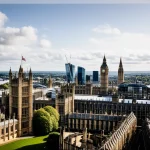Overview of Recent UK Environmental Policies
Recent UK environmental policies mark significant steps in climate action and sustainability advancement. The government has introduced stringent environmental regulations focusing on reducing carbon emissions and promoting green technologies. Notably, recent policy changes include enhanced targets for net-zero emissions by 2050 and incentives for renewable energy investment.
Key government initiatives target both climate change and ecosystem restoration. For example, the UK’s 25 Year Environment Plan outlines ambitions to improve air and water quality, enhance biodiversity, and encourage sustainable land use. Legislation such as the Environment Act 2021 reinforces legal frameworks supporting these goals, addressing issues from plastic waste to habitat preservation.
Also read : How is the UK dealing with rising healthcare demands?
These recent policy changes also bring attention to the protection of biodiversity. New regulations aim to safeguard vulnerable species and natural habitats, integrating ecosystem health within broader environmental goals. The combination of stricter emissions controls and biodiversity-focused laws demonstrates a comprehensive approach in UK environmental governance, balancing economic growth with ecological responsibility.
Overall, these updated environmental regulations represent a foundational shift in the UK’s commitment to sustainable development and climate resilience, setting ambitious milestones for the coming decades.
This might interest you : What Innovations Are Shaping Tomorrow’s United Kingdom?
Projected Environmental Outcomes and Expert Predictions
Considering future implications of UK environmental regulations
The future environmental impact UK policies aim at is multifaceted, focusing on climate change mitigation and ecosystem restoration. Expert opinions UK environment widely suggest that these recent policy changes could significantly reduce greenhouse gas emissions by 2030, aligning with the net-zero 2050 target. Data-driven projections show a potential drop in carbon output by up to 40% within the next decade if policies are effectively implemented.
Leading environmental organisations predict enhanced biodiversity as a direct benefit, thanks to stricter habitat protection laws. They also emphasize the importance of continuous monitoring to ensure policy outcomes meet expectations. Some experts caution that without adaptive management and sufficient funding, progress could stall, underscoring the dynamic nature of environmental governance.
The combination of legal frameworks, incentives for green technologies, and ecosystem health strategies creates a comprehensive package. These measures position the UK to play a key role in global climate initiatives. However, modelling scenarios reveal that achieving ambitious targets hinges on overcoming challenges like industrial transition and public engagement. Overall, the projected outcomes offer promising advances, contingent on effective execution and ongoing policy refinement.
Challenges and Drawbacks of Recent Policies
Recent UK environmental policies face several notable hurdles that may affect their overall success. One key policy challenge UK environment stakeholders highlight is the gap between ambitious legislative goals and real-world implementation. Enforcement mechanisms often lag, making it difficult to ensure compliance with new environmental regulations. This raises concerns about the effectiveness of recent policy changes in achieving their intended impact.
Economic costs present another significant drawback. Industries adapting to stricter rules may encounter financial strain, leading to resistance or delays in transitioning to greener practices. The balance between environmental progress and economic viability remains delicate, as some sectors worry about competitiveness and job losses.
Legislative gaps also merit attention. Current policies sometimes lack clarity on specific issues such as agricultural emissions or urban pollution controls, potentially hampering comprehensive environmental governance. Addressing these weaknesses requires ongoing evaluation and amendment.
In summary, while the UK’s updated environmental framework sets a strong foundation, overcoming challenges related to enforcement, economic impact, and policy coverage is essential for sustained progress within the country’s ambitious climate and sustainability agenda.
Response from Public, Industry, and Environmental Groups
The public reaction UK environmental law has been mixed but increasingly engaged. Awareness campaigns and educational efforts are enhancing citizen understanding of recent policy changes, fostering community support for sustainability initiatives. However, some groups express frustration over perceived slow progress and unclear communication about policy enforcement.
From an industry adaptation perspective, businesses face challenges balancing compliance costs with operational continuity. Many sectors appreciate government incentives promoting green technologies but seek clearer guidance on regulatory expectations. Industries emphasize the need for transitional support to achieve long-term sustainability goals without jeopardizing economic stability. This cautious stance reflects concerns about competitive disadvantages and workforce impacts.
Environmental NGOs provide critical yet constructive feedback on the UK environmental policies. They applaud legislative advancements, especially regarding habitat protection and emissions reduction, while urging stronger enforcement and more ambitious targets. Advocacy groups highlight the necessity of transparent reporting mechanisms to monitor policy outcomes effectively.
Together, public sentiment, industry adaptation, and NGO responses reveal a landscape of cautious optimism. Cooperation among these stakeholders is crucial to refine environmental regulations and ensure their successful implementation, bridging gaps between legislative intent and real-world impact.
Future Directions and Areas for Improvement
Looking ahead, the future UK environmental strategy focuses on enhancing current frameworks to address evolving challenges. Experts emphasize the necessity for adaptive policies that respond to scientific advancements and socio-economic changes. This involves refining monitoring systems to ensure transparency in tracking policy outcomes and improving public engagement for better compliance.
Key policy recommendations include closing existing legislative gaps, particularly regarding agricultural emissions and urban pollution control, which remain underregulated. Strengthening enforcement mechanisms is also critical to move beyond ambitions toward measurable results. Experts advocate for increased funding and support for industries during their transition phases, mitigating economic drawbacks while promoting sustainability outcomes.
Next steps for the UK environment must integrate international commitments with domestic goals, ensuring alignment with global climate agreements. This synergy bolsters the nation’s role in combating climate change and preserving biodiversity. Moreover, ongoing dialogue among government, industry, and environmental bodies remains essential. Collaborative efforts can generate innovative solutions, such as expanding renewable energy initiatives and enhancing ecosystem restoration projects.
Overall, a proactive approach with clear targets, robust legislation, and stakeholder involvement is crucial for the UK to advance its environmental agenda effectively.




